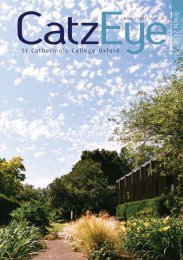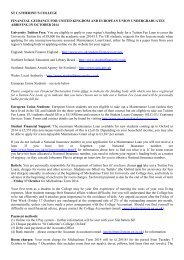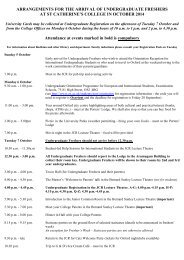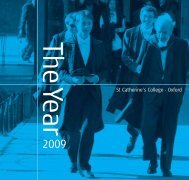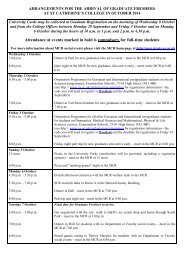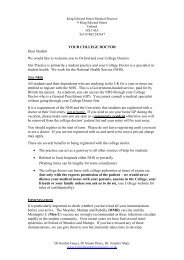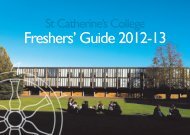Download PDF - St. Catherine's College - University of Oxford
Download PDF - St. Catherine's College - University of Oxford
Download PDF - St. Catherine's College - University of Oxford
You also want an ePaper? Increase the reach of your titles
YUMPU automatically turns print PDFs into web optimized ePapers that Google loves.
GAZETTE<br />
disabled. Compiled in 10 days, his 33-clause<br />
Bill required councils to register all disabled<br />
people; send them regular bulletins on<br />
available assistance; provide sheltered housing,<br />
home adaptations and recreational facilities;<br />
introduce the orange badge scheme; extend<br />
concessions on public transport; improve<br />
wheelchair access to public buildings and<br />
provide special lavatory facilities; and keep the<br />
young disabled out <strong>of</strong> geriatric wards.<br />
The Bill passed the Commons unopposed,<br />
though the Department <strong>of</strong> Health was<br />
unenthusiastic and the Treasury forced the<br />
deletion <strong>of</strong> crucial clauses on mobility. The<br />
Lords acclaimed it after speeches from four<br />
wheelchair-bound peers, but their zeal to<br />
extend the Bill put it at risk as an election<br />
loomed and only the provision <strong>of</strong> government<br />
time got it through.<br />
Its enactment earned Morris seats on the<br />
committees <strong>of</strong> many disability groups, and<br />
the Field Marshal Lord Harding award from<br />
disablement charities. Had Labour won in 1970,<br />
Morris would have joined the government.<br />
As it was, Wilson made him a social services<br />
spokesman with responsibility for the disabled;<br />
he would keep this job in opposition and in<br />
government for 22 years.<br />
He harried Sir Keith Joseph to implement<br />
sections <strong>of</strong> his own Bill which had yet to take<br />
effect — notably the provision for registering<br />
the disabled — and blacklist recalcitrant<br />
councils; well into the 1980s, Morris recorded<br />
cases <strong>of</strong> foot-dragging.<br />
When Labour regained power in March<br />
1974, Wilson made Morris a Parliamentary<br />
Under-Secretary at the DHSS and Minister<br />
for the Disabled, with a brief covering twelve<br />
departments. In 1977 he unveiled Motability,<br />
a privately-financed car rental scheme for the<br />
disabled worked up by Lord Goodman and<br />
Jeffrey (later Lord) <strong>St</strong>erling.<br />
He heartened the disablement lobby by<br />
persuading Barbara Castle to bring in an<br />
invalidity pension, an invalid care allowance<br />
and the mobility allowance. He exempted the<br />
blind from NHS optical charges, and formed a<br />
watchdog Committee on Restrictions Against<br />
Disabled People. In the 1979 New Year’s<br />
Honours, Callaghan made him a Privy Councillor<br />
— a rare honour for a junior minister.<br />
In opposition Morris kept his portfolio. He<br />
stood apart from the warfare which afflicted<br />
Labour in the early 1980s, abstaining in the<br />
pivotal deputy leadership contest between<br />
Denis Healey and Tony Benn. After the<br />
Falklands conflict he accused ministers <strong>of</strong><br />
‘covering up’ the number <strong>of</strong> servicemen<br />
disabled on active service. He took up the<br />
cases <strong>of</strong> war widows on minimum pensions,<br />
and cancer patients exposed to radiation at<br />
nuclear tests in the 1950s.<br />
As a trusted senior backbencher, Morris chaired<br />
the Parliamentary Pensions Fund, the Commons<br />
Members’ Fund and the Parliamentary and<br />
Scientific Committee. He retired from the<br />
Commons in 1997; up to the final weeks he<br />
could be seen at the head <strong>of</strong> mass lobbies,<br />
one for haemophiliacs who had contracted HIV<br />
through blood transfusions.<br />
In the Lords with a life peerage, Morris led<br />
a series <strong>of</strong> revolts over the treatment <strong>of</strong> the<br />
disabled, teaming up with Lord (Jack) Ashley<br />
to oppose elements <strong>of</strong> Alistair Darling’s 1999<br />
Welfare Reform and Pensions Bill with a<br />
declaration that it ‘piled handicap on handicap<br />
for many thousands <strong>of</strong> disabled people’.<br />
Alf Morris married, in 1950, Irene Jones, with<br />
whom he had two sons and two daughters.<br />
Reproduced by kind permission <strong>of</strong> The<br />
Telegraph<br />
Peter Jones (1953, English), drawing on<br />
events described in Alf Morris: People’s<br />
Parliamentarian by Derek Kinrade (2007), adds:<br />
Alf did not immediate endear himself to<br />
<strong>College</strong> authorities. Long since politically<br />
active, less than two weeks into his first<br />
term he received an invitation to put<br />
himself forward for selection as the party<br />
ST CATHERINE’S COLLEGE 2012/61



